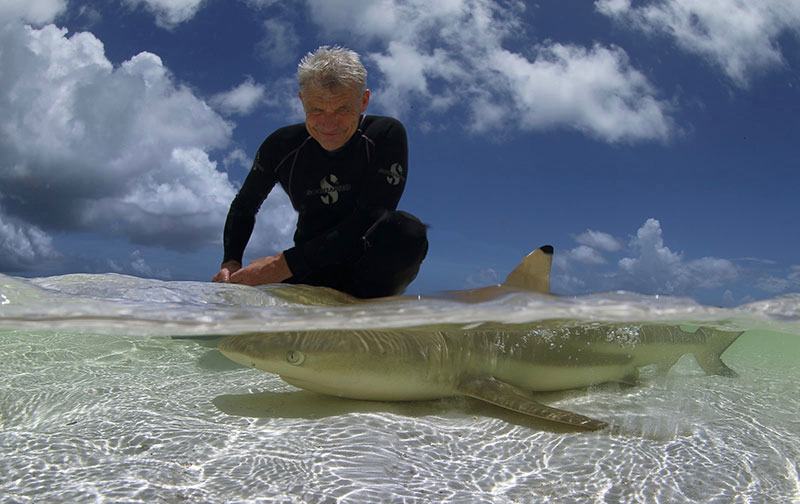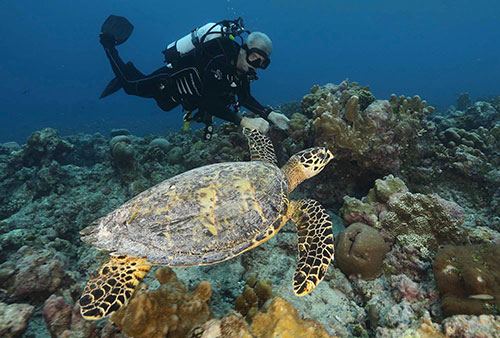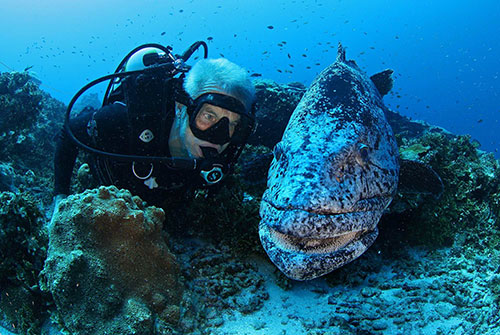SCUBAPRO Deep Elite Team - Paul Rose
Paul Rose
Paul Rose is an explorer, broadcaster and Expedition Leader for National Geographic Pristine Seas.
A man at the front line of exploration and one of the world’s most experienced science divers, polar explorers and expedition leaders, Paul Rose helps scientists unlock and communicate global mysteries in the most remote and challenging regions of the planet.
A broadcaster, published author and journalist, Rose presents BBC television programs on current affairs, science and the environment.His credits include the highly acclaimed BBC Oceans, Britain’s Secret Seas, Voyages of Discovery and Royal Television Society Award winning series, The Lakes. An active Journalist, he is a member of the Chartered Institute of Journalists, the National Union of Journalists, the Geneva Press Club and the Swiss Association of Science Journalism.
Rose is Ambassador for the United Nations Environment Programme – Basel, Rotterdam and Stockholm Conventions. He is Vice President of Deptherapy,a charity providing specially adapted scuba diving programs for seriously injured armed service personnel. Rose was the Base Commander of Rothera Research Station, Antarctica, for the British Antarctic Survey for ten years and was awarded HM The Queen's Polar Medal. For his work with NASA and the Mars Lander project on Mt Erebus, Antarctica, he was awarded the US Polar Medal. Royal Geographical Society awarded him the Ness Award and the Founders Gold Medal. A mountain in Antarctica is named after him.

An Interview with Paul Rose
Why did you decide to take the giant stride into the oceans?
I have always loved being in the sea and as a kid my parents had terrible trouble getting me out of the water. At about 10 years old I would always swim as far out as possible until land was almost invisible and then just drift around. I wasn’t at all worried about the tides and currents and so I still remember those surprise arrivals onto the wrong beach!
I grew up watching Jacques Cousteau and his great team travelling the world on his ship, Calypso, discovering new species, getting up close and personal to big sharks and I could see myself wearing a red hat and enjoying life in his team. Plus, Hans and Lotte Hass were working together to study the reefs and Hans was producing powerful black and white images which had a big effect on me. They look hellish grainy by today’s standards but at the time they were exciting, revelatory things. But naturally, as a young boy it was the fictional character, Mike Nelson, who became my instant hero. In his magnificent series, Sea Hunt, Mike was having proper underwater adventures - rescuing pilots from crashed jets, finding miners trapped in flooded mines and all the beautiful girls wanted Mike to teach them to dive. So at 11 years old I thought “That’s for me!”
I learned to dive at the Ilford branch of BSAC and was so impatient to finish the training that I also went to Walthamstow BSAC so that I had two training sessions a week. My first dive was Easter 1969 at Chesil Cove, Portland and as I descended the cold sea rushing in through the seams of my homemade wet suit told me that I was free to explore in the world’s largest, least understood, most powerful and least protected ecosystem.
How has diving changed your life?
I am defined by diving – the perspective of global issues, challenges ahead and successes made are always best when made in the wild places and ideally whilst diving.
From the moment of my first dive in 1969 I felt connected to the wild places. I hadn’t done much travelling, but being a diver quickly made sense of the call of the distant wild places. As a diver my confidence grew and I knew that I had to follow my dream of working in remote, challenging places.
What kind of diving do you like to do?
Exploratory diving for science, especially in the polar regions is the best! I often dive in places that have either never been dived before or have only been studied on rare occasions. The first dive in a new place is a wonderful experience of course – but I do love going back to Chesil Cove and making a dive where it all started for me.
Tell me what, if you had to pick one of the most amazing experiences underwater, what would it be?
Meeting the beautiful six-gill shark in the Mediterranean whilst making BBC Oceans. The six-gills are hard to find and in the Straits of Messina, they are known for coming up from great depth at the times of a new moon to about 40 metres. After three attempts of diving at around the exact time of the new moon and also slack water, I didn’t think we would ever find the shark. So for our final dive we made it a couple of hours later when the tide was running fast so that I could cover more ground and it made the dive easier to control as the water was a nice smooth, fast, laminar flow, rather than the chaotic streams at slack water. In the last 10 minutes of the final dive at 35 metres I saw these two huge green eyes coming up towards me and there it was, a beautiful 4 metre long six-gill shark. Those 10 minutes flew by. It was an exciting and moving experience that I shall never forget. I’ve since seen other six-gills in the footage from our remote drop-cameras and when I do it’s like seeing an old friend.

Of your list of accomplishments in your diving career, what are you most proud of?
Leading the National Geographic Pristine Seas expeditions is a great honour as I work with an extraordinary team and we have a powerful impact. With 31 expeditions completed we have helped to establish 23 marine protected areas totaling over 6 million square kilometres. The past year we have been working remotely of course, but I’ve been happily surprised with the amount of progress we can make during these challenging times. We should be back at sea in October.
Where are some of your favorite places underwater?
- Chesil Cove at Portland. The site of my first dive and I’m keen to get back!
- Antarctica. Where almost every dive was a world-first and bursting with new discoveries.
- The Arctic. Particularly diving under the ice to study and report of the effects of climate change.
- Any truly pristine reef. Where we instantly see that there are a lot of sharks and we are not at the top of the food chain!
What is your advice to someone considering diving?
My advice, as ever, is to please do try diving! Our school systems should be more focused on learning outside the classroom. My dream is that by default all lessons should be taught outside and that special dispensation be need for those classes that have to be done inside. Imagine if scuba and snorkeling were a mandatory part of all school curricula. It surely is the very best way to learn all subjects.If people try diving and realize that it’s not for them, then at least the experience will have opened their eyes to it and often leads to them being very active snorkelers which is terrific.
Why do you think we should encourage more people to dive?
It is essential that we have a deep connection to nature. COVID-19 was caused by our out-of-balance relationship with nature. Fortunately, we now have the vaccines, but the only vaccine against future pandemics is to reset our values and regain a healthy relationship with the natural world. The very best way of understanding the issues and of making change happen is by fulfilling our need for physically engaging with nature. And of course, diving in the most powerful, least explored, least protected ecosystem on the planet is the finest way of doing that. Decisions made by political leaders would be so much more sustainable if they were all divers!

What would you tell people about the oceans?
The ocean is the most powerful, least explored, least protected ecosystem on the planet and is the finest place to understand global issues. All the best thinking comes from being in the ocean.
What is the favorite thing in your dive bag?
My Scubapro gear! In the early days I longed for Scubapro equipment and finally had enough money for a MK5 109 regulator and a pair of Jet Fins. I used those for many years in the US when I was training divers, diving the deep shipwrecks in the Great Lakes and ice diving. Luckily I now have a great supply of Scubapro gear, but I never take it for granted as those memories of needing good equipment remain sharp.
Why is SCUBAPRO your choice for dive equipment?
It works beautifully and let’s face it – it is beautiful. I have my Scubapro equipment out and visible at all times to help me to connect to the ocean when I am home. Purity of art and function is always a winner for me.